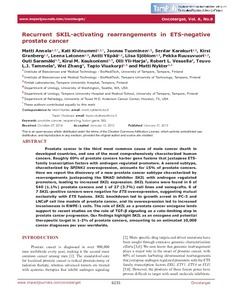Recurrent SKIL-activating rearrangements in ETS-negative prostate cancer
Annala, Matti; Kivinummi, Kati; Tuominen, Joonas; Karakurt, Serdar; Granberg, Kirsi; Latonen, Leena; Ylipää, Antti; Sjöblom, Liisa; Ruusuvuori, Pekka; Saramäki, Outi; Kaukoniemi, Kirsi; Yli-Harja, Olli; Vessella, Robert; Tammela, Teuvo; Zhang, Wei; Visakorpi, Tapio; Nykter, Matti (2015)
Annala, Matti
Kivinummi, Kati
Tuominen, Joonas
Karakurt, Serdar
Granberg, Kirsi
Latonen, Leena
Ylipää, Antti
Sjöblom, Liisa
Ruusuvuori, Pekka
Saramäki, Outi
Kaukoniemi, Kirsi
Yli-Harja, Olli
Vessella, Robert
Tammela, Teuvo
Zhang, Wei
Visakorpi, Tapio
Nykter, Matti
2015
Oncotarget 6 8
6235-6250
BioMediTech - BioMediTech
Lääketieteen yksikkö - School of Medicine
Julkaisun pysyvä osoite on
https://urn.fi/URN:NBN:fi:uta-201609072244
https://urn.fi/URN:NBN:fi:uta-201609072244
Kuvaus
This article has supplementary files, which can be found here:http://dx.doi.org/10.18632/oncotarget.3359
Tiivistelmä
Prostate cancer is the third most common cause of male cancer death in developed countries, and one of the most comprehensively characterized human cancers. Roughly 60% of prostate cancers harbor gene fusions that juxtapose ETS-family transcription factors with androgen regulated promoters. A second subtype, characterized by SPINK1 overexpression, accounts for 15% of prostate cancers. Here we report the discovery of a new prostate cancer subtype characterized by rearrangements juxtaposing the SMAD inhibitor SKIL with androgen regulated promoters, leading to increased SKIL expression. SKIL fusions were found in 6 of 540 (1.1%) prostate cancers and 1 of 27 (3.7%) cell lines and xenografts. 6 of 7 SKIL-positive cancers were negative for ETS overexpression, suggesting mutual exclusivity with ETS fusions. SKIL knockdown led to growth arrest in PC-3 and LNCaP cell line models of prostate cancer, and its overexpression led to increased invasiveness in RWPE-1 cells. The role of SKIL as a prostate cancer oncogene lends support to recent studies on the role of TGF-β signaling as a rate-limiting step in prostate cancer progression. Our findings highlight SKIL as an oncogene and potential therapeutic target in 1-2% of prostate cancers, amounting to an estimated 10,000 cancer diagnoses per year worldwide.
Kokoelmat
- Artikkelit [6140]
